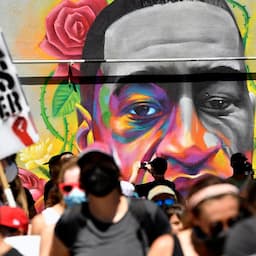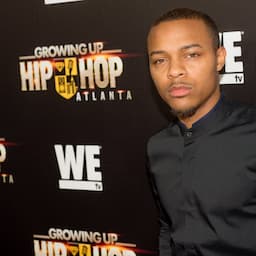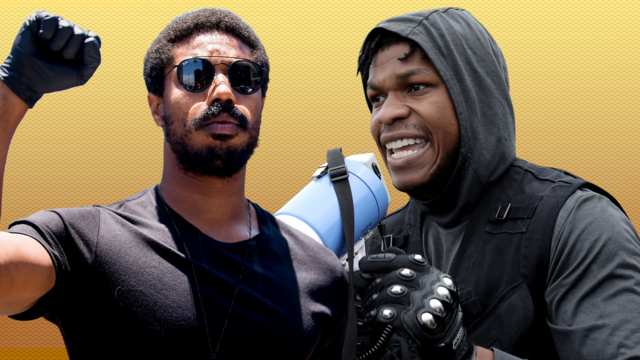Here are some of the Black actors and actresses who have utilized their platforms for social justice.
Black entertainers don’t always have the luxury of merely focusing on their craft without the inclusion of activism.
From the civil rights movement to the Black Lives Matter movement, Black Hollywood has spent decades on the front lines calling out oppressive systems both inside and outside of the entertainment business, standing against systemic racism, and reshaping the landscape and opening doors for future generations.
Acts of resistance have taken on many forms in Black Hollywood over the years, but has always been anchored in a commitment to liberation.
Check below for a list of Black Hollywood activists, then and now.
Ossie Davis & Ruby Dee
As one of the most popular couples of Black Hollywood, the late Ossie Davis and Ruby Dee understood the intersection of acting and activism. The duo became fixtures during the civil rights and Black Power movements, befriending the likes of Malcolm X and Martin Luther King Jr., and helped organize the 1963 March on Washington. Davis also delivered the eulogy at Malcolm X’s funeral in 1965.
Eartha Kitt
Never one to hold her tongue, Eartha Kitt's career was nearly ruined due to her criticism of the Vietnam War. Throughout her life, the actress and singer addressed socio-political issues, racism and sexism, donated her paychecks to help the civil rights movement and expressed opposition to the Black Panther Party, but it was a 1968 luncheon on juvenile delinquency that landed Kitt on a government watch list.
“We have forgotten the main reason we have juvenile delinquency,” Kitt said at the event hosted by President Lyndon B. Johnson's wife, Lady Bird. "You send the best of this country off to be shot and maimed. They rebel in the street. They will take pot, and they will get high. They don’t want to go to school because they’re going to be snatched off to be shot in Vietnam."
According to Kitt, Johnson was so incensed by the criticism that she was investigated by the CIA, was blackballed by the entertainment industry and forced to work in Europe for several years before making her return to Broadway in the late 1970s.
Lena Horne
Lena Horne had an early introduction to activism thanks to her grandmother, who signed her up for an NAACP membership when she was just a child. As her star rose in Hollywood, Horne used her fame to bring attention to social justice issues, which included performing at civil rights rallies throughout the South, donating her earnings to the NAACP, participating in the 1963 March on Washington, and supporting the National Council for Negro Women.
In 2019, Solange Knowles became the first recipient of the Lena Horne Prize, which honors artists creating a social impact.
Sidney Poitier & Harry Belafonte
These legendary actors have devoted much of their lives to political activism and human rights issues, both prominent figures in the civil rights movement who lent their voices, resources, and finances to the cause.
Belafonte and Poitier were also among the list of celebrity attendees at the 1963 March on Washington alongside Dr. Martin Luther King Jr., who once said of Poitier, “He’s a man of great depth, a man of great social concern, a man who is dedicated to human rights and freedom.”
Beyond showing up to the march, Belafonte delivered a speech on behalf of a collective of actors, which included Poitier and Horne, Diahann Carroll, Paul Newman and Joanne Woodward, Marlon Brando, Sammy Davis Jr., Burt Lancaster, and Charlton Heston.
During his address, Belafonte spoke about the link between racism and voter suppression and intimidation. "We are here to protest this evil," he declared. "And to make known our resolve to do everything we can possibly do to bring it to and end.”
Dick Gregory
Comedian, actor and writer Dick Gregory was an activist both on and off the stage. For Gregory, who died in 2013, comedy became a vehicle to sound off on racism and bigotry, the Vietnam War, gender equality, and other topics. Although Gregory's activism stretched decades, one of his most notable efforts forced the FBI to investigate the 1964 disappearance of three Black civil rights workers slain in Mississippi.
Suspecting that local police were involved in the men going missing, Gregory (with help from Hugh Hefner) put together a $25,000 reward for information on the case. The FBI eventually matched the award amount amid criticism for not investigating the incident, which ultimately led the agency to find the men’s remains 44 days after they disappeared.
Sammy Davis Jr.
Being the sole Black member of the Rat Pack, Sammy Davis Jr., walked a complicated tightrope between criticism that he received for enforcing racial stereotypes, and becoming financially successful enough to spread his wealth.
Davis was a supporter and friend to Martin Luther King Jr., and parlayed his fame into a fundraising tactic. He performed at numerous civil rights events including a 1961 tribute concert for Dr. King, a Los Angeles Freedom Rally hosted by the late civil rights icon, and the 1965 "Stars of Freedom" rally. It’s estimated that Davis raised $750,000 for the civil rights movements.
Kendrick Sampson
The Insecure actor has gone to battle in the war against racism and police brutality. Following the deaths of George Floyd and Breonna Taylor, Sampson was beaten with a baton by police and shot with rubber bullets during a Black Lives Matter march last month, but that hasn't deterred him from being a vocal proponent of defunding police budgets.
Sampson, who is also the founder of the non-partisan grass roots social justice group BLD PWR, and a coalition of over 300 Black actors, penned an open letter calling out Hollywood for lacking a “true commitment” to inclusion, and for contributing to the “criminalization of Black people, the misrepresentation of the legal system, and the glorification of police corruption and violence.”
Kerry Washington
The actress shot to fame as a political “fixer" on Scandal, and in real life, Kerry Washington doesn't shy away from using her voice to bring change. Washington has promoted numerous social justice and political causes such as voter registration, gun control, LGBTQ rights, and her work within the Black Lives Matter, Me Too and Time's Up movements.
On the acting front, Washington has chosen roles that address social justice issues such as the Broadway play American Son, which was adapted into a Netflix series. The production brought attention to police brutality and the killings of Tamir Rice, Eric Garner and Philando Castile.
Jesse Williams
The Grey’s Anatomy star has been forthright on social justice issues and amplifying the Black Lives Matter movement. In 2016, Williams delivered a powerful speech denouncing racial oppression and police brutality while receiving the Humanitarian Award during the BET Awards.
"We’ve been floating this country on credit for centuries, and we’re done watching and waiting while this invention called whiteness uses and abuses us, burying Black people out of sight and out of mind while extracting our culture, our dollars, our entertainment like oil -- Black gold, ghettoizing and demeaning our creations then stealing them, gentrifying our genius and then trying us on like costumes before discarding our bodies like rinds of strange fruit," Williams said. "The thing is though…just because we’re magic doesn’t mean we’re not real."
Laverne Cox
As one of the most prominent Black trans actresses in Hollywood, The Orange Is the New Black star has been an advocate for trans rights, trans representation, and amplifying the stories of the trans community, particularly Black trans women who are being murdered and attacked at alarming rates.
Cox is the executive producer of the phenomenal Netflix documentary Disclosure, which details the plight of the trans community within the space of film and television.
Viola Davis
Activism has been an important part of Viola Davis' world. The Oscar-winning actress is championing diversity and visibility for marginalized voices, equal pay, and hosted a small Black Lives Matter protest in her neighborhood. But Davis' biggest act of resistance has been existing as a Black woman.
“I feel like my entire life has been a protest,” Davis reveals in the August 2020 cover story for Vanity Fair magazine. “My production company is my protest. Me not wearing a wig at the Oscars in 2012 was my protest. It is a part of my voice, just like introducing myself to you and saying, ‘Hello, my name is Viola Davis.’”
Michael B. Jordan
The Black Panther star is so committed to improving diversity in Hollywood that he added a diversity clause to all of his projects. Jordan started out as a child actor but his breakout role was portraying Oscar Grant in Fruitvale Station, a film chronicling the life and death of a 22-year-old father who was killed by police on New Year’s Day in 2009.
Last month, Jordan joined protestors in a massive BLM march in Los Angeles, where he challenged Hollywood to improve diversity.
Gabrielle Union
Whether it's sharing her personal experiences with racism, discrimination, and sexual assault, or speaking on behalf of others, Gabrielle Union uses her platform to bring attention to a number social issues such as the Black Lives Matter movement, sexual violence, and is a proud ally to the LGBTQIA community.
RELATED CONTENT:




